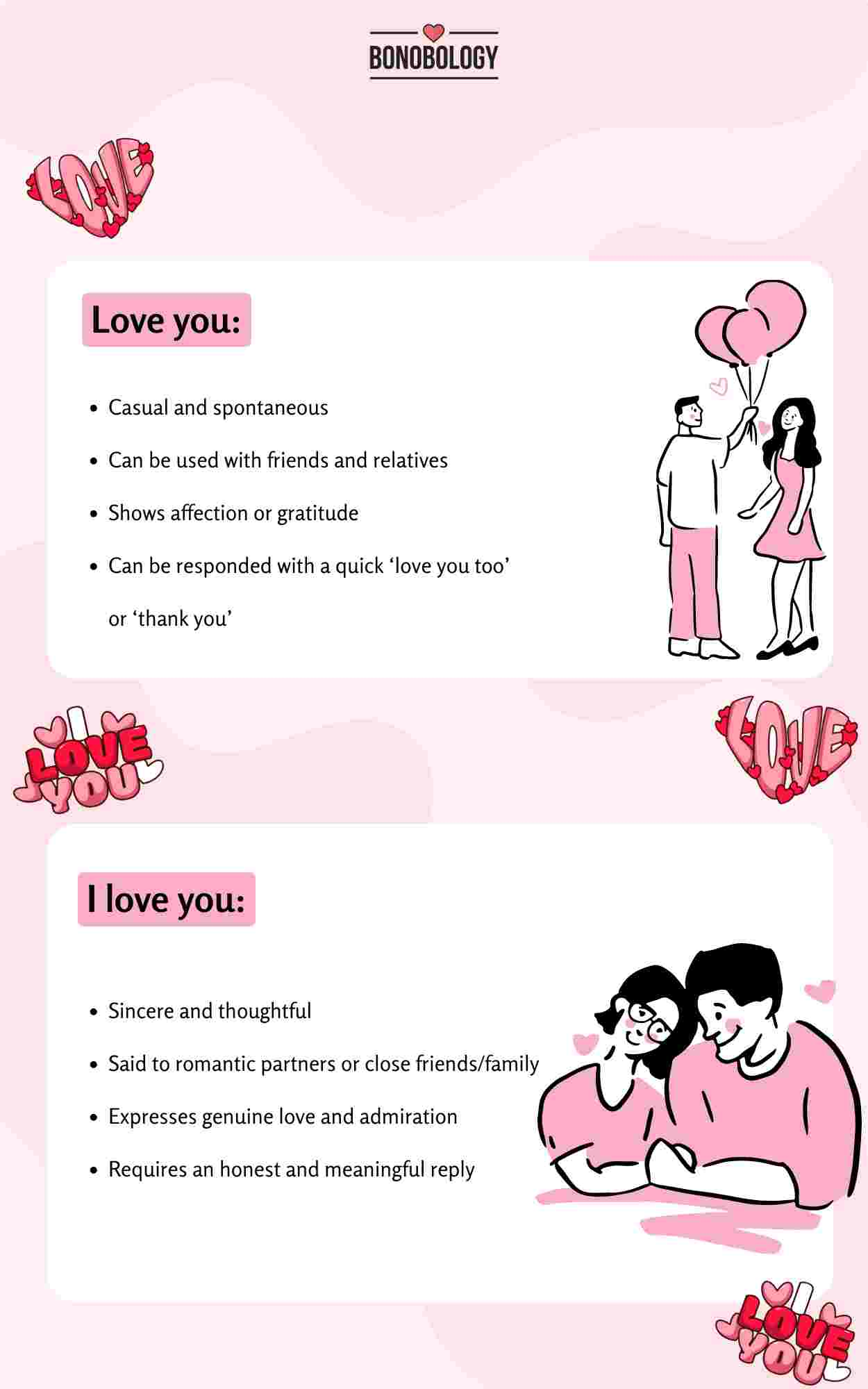Does it ever feel less genuine when your partner says love you instead of I love you? Or does saying I love you in a casual relationship feel weird? This is because the seemingly similar phrases can convey totally different meanings. So is there a difference between I love you and love you? To understand better, we talked to Dr. Shefali Batra (MD in psychiatry), a California-based psychiatrist and cognitive behavior therapist, who specializes in counseling for separation and divorce, breakup and dating, and premarital compatibility issues.
What’s The Difference Between Love You And I Love You
Table of Contents
Imagine you’re scrolling through your texts, and you notice that some people say love you and some spell it out and personalize their affection with an I love you. Is there a secret code behind these phrases? Perhaps. Lets understand what’s the difference between love you and I love you over text or otherwise.
Related Reading: 21 Ways You Are Unconsciously Saying “I Love You” To Your SO
Love you is casual
Dr. Shefali describes love you as a friendly fist bump of fondness or gratitude. You might say it to your best friend after they do something sweet, like save you from a boring meeting. It’s light, casual, and perfect for everyday use.
I love you is more sincere

Saying I love you is a grand gesture, the bouquet of roses awaiting under your balcony. When you add that little “I,” you’re diving into deeper emotional waters. When your boyfriend says I love you during a cozy dinner, it feels intimate and personal — a full embrace compared to a friendly pat on the back.
This is not to say that the phrase is only reserved for your romantic partner. Explaining the meaning of I love you, Dr. Shefali emphasized that the difference between love you and I love you is not that one is platonic and the other romantic. You can very well say I love you to close family, such as your parents or children. Similarly, you can also use it with close friends, depending on your friendship dynamics. Just remember that I love you displays stronger feelings, whether in a romantic relationship or a platonic relationship.
Love you vs I love you
| Love You | I Love You |
| Casual | Sincere |
| Said spontaneously out of habit | A meaningful expression filled with emotions |
| To express gratitude and affection | To express love and admiration |
| Can be used with casual friends and relatives | Reserved for romantic partners and close family/friends |
Love You Vs I Love You: When To Use Which
Now that we understand what’s the difference between love you and I love you over text or talking irl, it’s clear that both should be used in different situations or your feelings can be misinterpreted. So when should you use love you vs I love you? Here’s what Dr. Shefali suggests:
When to use love you
You can use love you to show friendliness in a social circle or a casual relationship. The phrase lets the person know that they hold a place in your life without sounding too intense or giving mixed signals. Love you can also replace ‘thank you’ but make sure to say it to someone you already know. Saying love you to a stranger who told you the time may make things weird. Here are some scenarios where you can use love you:
- You always know what to say to make me feel better, love you!
- See you tomorrow, love you!
- You’re a sweetheart for helping me with the homework yesterday, love you!
When to use I love you
I love you should be used to express deep platonic or romantic feelings. It is a sincere expression, and you should use it only after understanding what is the meaning of I love you in your dictionary. You can say it to your partner to express your feelings of love for them. You can also say it to a close family member or friend to let them know that they are close to your heart and you cherish them. Here are some examples:
- You make my life a better place, I love you.
- I am so lucky to have you as my partner, I love you.
- I admire your kindness. You’re beautiful inside out, I love you so much.
How To Respond To Love You
Since love you is usually used in casual relationships, the response doesn’t need to be too thought out. Don’t sweat it out, just say what feels right in the moment. Here are some ways you can respond to love you:
- Love you too!
A classic choice.
- Of course you do, I am a delight!
A witty alternative. Go ahead if it feels on-brand for you.
- Haha, thanks!
May come off as slightly awkward, but totally acceptable if you are not comfortable with saying love you. Healthy boundaries are important in all relationships.
- Why?
Nothing like some self-deprecating humor to keep things interesting.
- I love me too!
Adds some spicy sass to the sweet conversation.

How To Respond To I Love You
Now, as I love you is a more sincere expression, it demands an equally meaningful reply. Saying I love you takes courage and vulnerability and it’s only fair to respond with the same sincerity. Here are some ways you can respond to ‘I love you:
- I love you too!
If you reciprocate the feeling and want to match their energy, this is the one.
- I know. (With a smug look)
This is a sassy one. Use this only if you already have an established relationship with the person as it could come off as rude otherwise.
- I like you and care about you, but I’ll need some time before I can say it back
If your boyfriend says I love you for the first time, and it catches you off guard, don’t feel pressured to say it back. Figure out what does love mean to you, and if you’re not ready to reciprocate the feeling yet, be honest with them.
- I appreciate you telling me, but I would like us to be just friends
if you don’t have any romantic feelings toward them, it’s better to clear things up than to lead the person on. It may seem a bit hurtful in the moment, but will be beneficial for both of you in the long term.
FAQs
1. Which is better: I love you or love you?
It differs based on the intent behind the phrase. Think, “what does love mean to you?”. For expressing casual affection, love you is a better choice. But if you want to show sincere love and admiration for the person, use I love you.
2. Which is stronger: I love you or I’m in love with you?
There is a difference between being in love and loving someone. Saying I’m in love with you is like fireworks—it’s passionate and intense. It’s the ultimate romantic declaration, while I love you is more like a cozy hug—warm and comforting. Both are powerful, but I’m in love with you can set hearts racing.
Key Pointers
- Is there a difference between I love you and love you? Yes! A big one
- Love you is casual while I love you is more sincere
- There is a difference between being in love and loving someone
- I am in love with you’ is an even more intense expression of your feelings
- Love you can be responded with a quick love you too
- I love you or ‘I am in love with you’ requires a more thoughtful response
Final Thoughts

The answer to “What’s the difference between love you and I love you?” may differ from person to person. In the end, whether it’s a casual love you or a profound I love you, what matters is the sincerity behind the words. Of course, there are no rules set in stone for expressing emotions. So, you do you. Just be careful not to blurt out, “I’m in love with you” to your pizza delivery guy… unless you want to make your next few deliveries very interesting!
8 Ways To Deal With Saying ‘I Love You’ And Not Hearing It Back
Your contribution does not constitute a charitable donation. It will allow Bonobology to continue bringing you new and up-to-date information in our pursuit of helping anyone in the world to learn how to do anything.
Ask Our Expert
You must be Logged in to ask a question.


Featured
25 Bedtime Stories For Girlfriend
From Self-Awareness To Compatibility: Digital Twins For Modern Relationships
Situationship Vs Relationship: Can One Lead To The Other?
How To Get A Guy To Like You: 20 Simple Techniques, No Mind Games
Situationship Vs Friends With Benefits: Similarities And Differences
125 Spicy Questions To Ask Your Boyfriend
125 Deep Questions To Ask Your Boyfriend To Truly Understand Him
Balancing Love And Learning: How Online Degrees Can Strengthen Relationships
What Is A Power Couple? 15 Signs You And Your Partner Are One
What Is The Role Of A Husband In A Modern Relationship?
Marrying An Older Woman: Pros And Cons, And How To Make It Work
Everything You Need To Know About Transactional Relationships
Premarital Counseling – 12 Reasons You Should Opt For It
Living Apart Together: Decoding The Latest Trend Said To Save Relationships
Domestic Partnership vs Marriage: Difference & Benefits
Marrying For Money: Is It The Right Choice For You And How To Make It Work?
21 Things To Know When Dating A Man With Kids
Surprising Psychological Benefits Of Women Proposing To Men And 19 Ways To Do It Right
A Guide To Platonic Marriage
The Ultimate Wedding Plan Guide